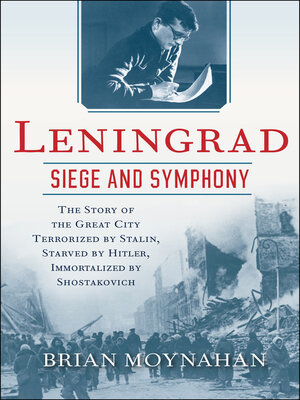Leningrad
ebook ∣ Siege and Symphony: The Story of the Great City Terrorized by Stalin, Starved by Hitler, Immortalized by Shostakovich
By Brian Moynahan

Sign up to save your library
With an OverDrive account, you can save your favorite libraries for at-a-glance information about availability. Find out more about OverDrive accounts.
Find this title in Libby, the library reading app by OverDrive.



Search for a digital library with this title
Title found at these libraries:
| Loading... |
The “gripping story” of a Nazi blockade, a Russian composer, and a ragtag band of musicians who fought to keep up a besieged city’s morale (The New York Times Book Review).
For 872 days during World War II, the German Army encircled the city of Leningrad—modern-day St. Petersburg—in a military operation that would cripple the former capital and major Soviet industrial center. Palaces were looted and destroyed. Schools and hospitals were bombarded. Famine raged and millions died, soldiers and innocent civilians alike.
Against the backdrop of this catastrophe, historian Brian Moynahan tells the story of Dmitri Shostakovich, whose Seventh Symphony was first performed during the siege and became a symbol of defiance in the face of fascist brutality. Titled “Leningrad” in honor of the city and its people, the work premiered on August 9, 1942—with musicians scrounged from frontline units and military bands, because only twenty of the orchestra’s hundred members had survived.
With this compelling human story of art and culture surviving amid chaos and violence, Leningrad: Siege and Symphony “brings new depth and drama to a key historical moment” (Booklist, starred review), in “a narrative that is by turns painful, poignant and inspiring” (Minneapolis Star-Tribune).
“He reaches into the guts of the city to extract some humanity from the blood and darkness, and at its best Leningrad captures the heartbreak, agony and small salvations in both death and survival . . . Moynahan’s descriptions of the battlefield, which also draw from the diaries of the cold, lice-ridden, hungry combatants, are haunting.” —The Washington Post
For 872 days during World War II, the German Army encircled the city of Leningrad—modern-day St. Petersburg—in a military operation that would cripple the former capital and major Soviet industrial center. Palaces were looted and destroyed. Schools and hospitals were bombarded. Famine raged and millions died, soldiers and innocent civilians alike.
Against the backdrop of this catastrophe, historian Brian Moynahan tells the story of Dmitri Shostakovich, whose Seventh Symphony was first performed during the siege and became a symbol of defiance in the face of fascist brutality. Titled “Leningrad” in honor of the city and its people, the work premiered on August 9, 1942—with musicians scrounged from frontline units and military bands, because only twenty of the orchestra’s hundred members had survived.
With this compelling human story of art and culture surviving amid chaos and violence, Leningrad: Siege and Symphony “brings new depth and drama to a key historical moment” (Booklist, starred review), in “a narrative that is by turns painful, poignant and inspiring” (Minneapolis Star-Tribune).
“He reaches into the guts of the city to extract some humanity from the blood and darkness, and at its best Leningrad captures the heartbreak, agony and small salvations in both death and survival . . . Moynahan’s descriptions of the battlefield, which also draw from the diaries of the cold, lice-ridden, hungry combatants, are haunting.” —The Washington Post






